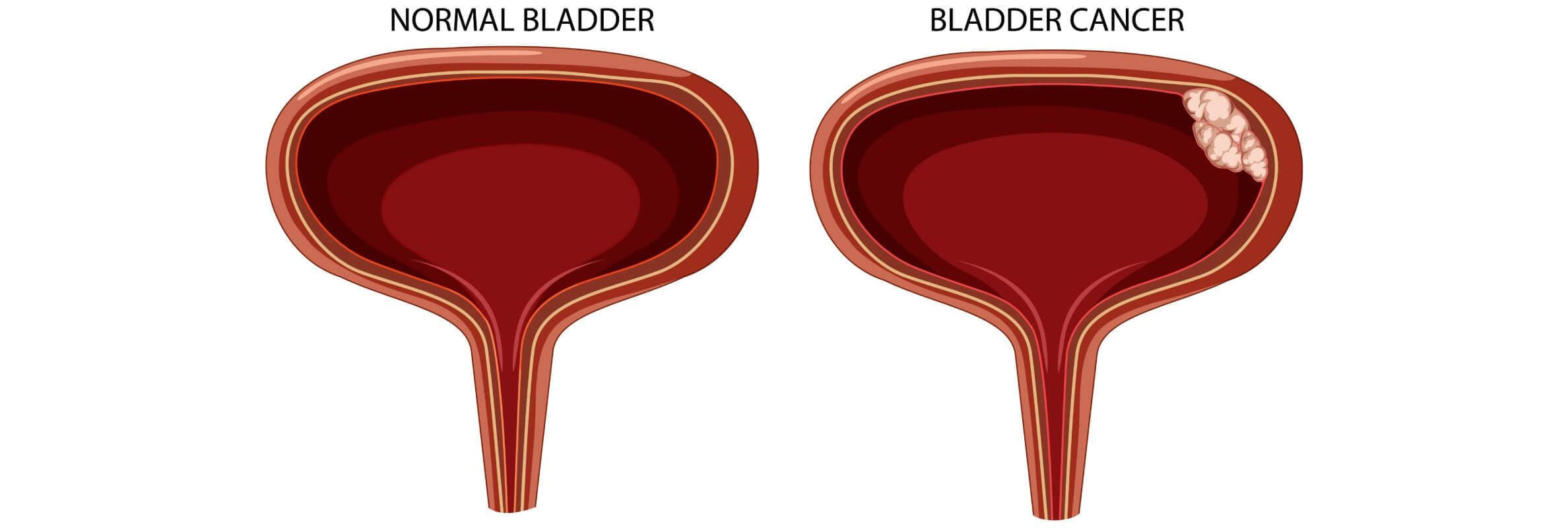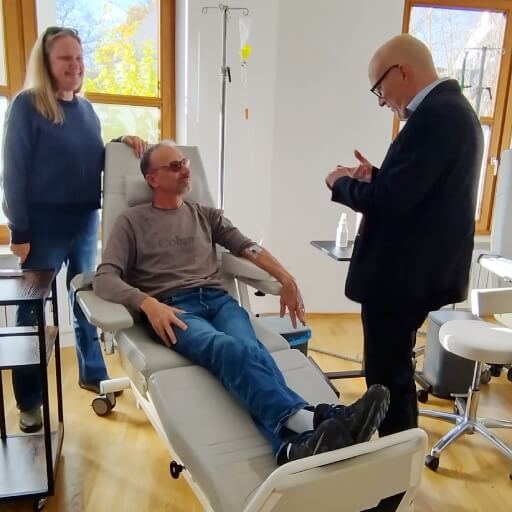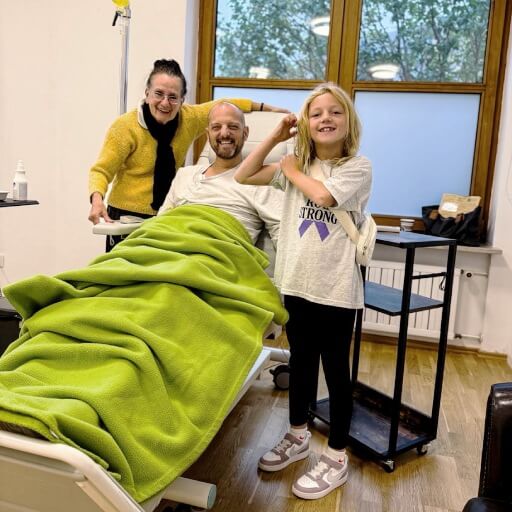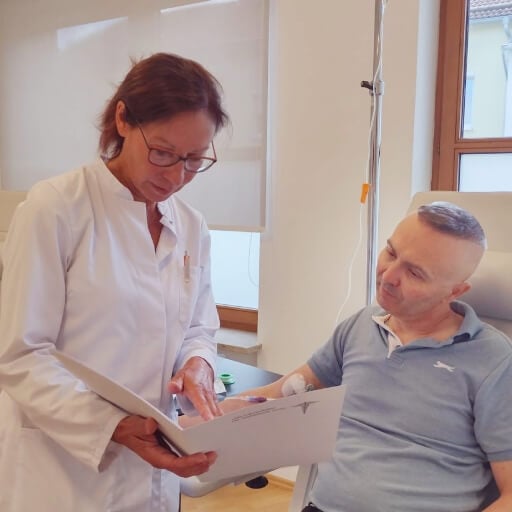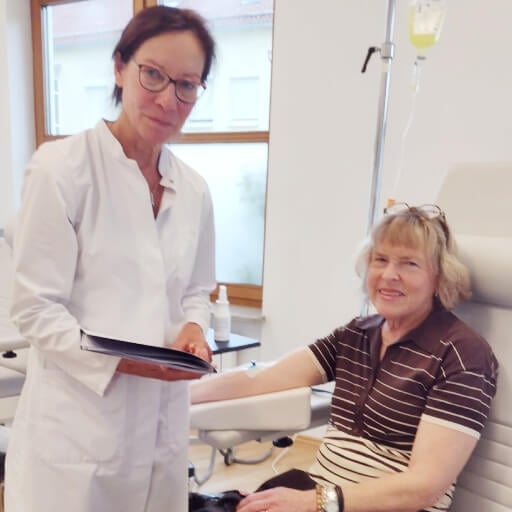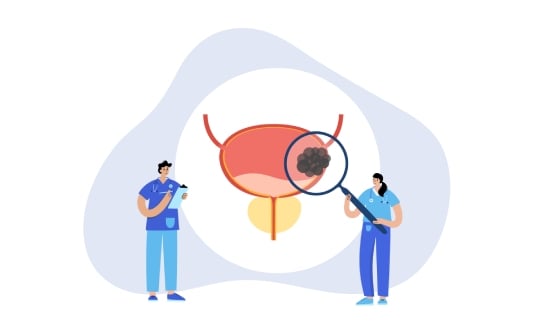According to data from GLOBOCAN (Global Cancer Incidence, Mortality, and Prevalence), about 573,000 cases of bladder cancer (BC) were diagnosed worldwide in 2020. This represents about 3% of all new cancers diagnosed. The countries with the highest incidence are mainly located in Southern and Western Europe and North America. The highest incidence of bladder cancer in men is in Greece, and in females in Hungary. In Southern Europe, about 26.6 males and 5.8 females per 100,000 are diagnosed with bladder cancer annually, and consequently, bladder cancer cells are the subject of study regarding tumor growth, cancer progression, and the role of the immune system in controlling the disease [1].
In Germany, new approaches in bladder cancer treatment consist of using the powers of the immune system in order to be more effective in fighting the bladder cancer cells. Bladder cancer immunotherapy is based on the activity of immune cells in inducing a strong immune response, which results in the destruction of the cancer cells and the prevention of disease progression. Procedures such as intravesical immunotherapy, immune checkpoint inhibitors (ICI), and dendritic cell therapy give hope to patients with advanced bladder cancer.
What Is Bladder Cancer
Bladder cancer (BC) is a complex disease that affects thousands of people worldwide each year. Bladder cancer develops due to the uncontrolled growth of abnormal bladder cancer cells, resulting in the formation of tumors that can represent early-stage bladder cancer or aggressive tumors. A full understanding of how bladder cancer cells arise and are influenced in their growth is necessary for early detection and effective bladder cancer treatment. A combination of genetic, environmental, and lifestyle factors influences the occurrence of bladder tumors. Over time, mutations can occur in bladder lining cancer cells that allow the tumor cells to multiply unchecked. In some cases, bladder cells invade surrounding tissue or spread to distant organs; this is called metastatic bladder cancer. The immune system of the body also plays a critical role in suppressing the growth of the tumor tissue, but when the immune system cells do not notice or attack cancer cells, the disease can progress at a much quicker rate.
Types of Bladder Cancer
Bladder cancer is not a single disease but can exist in different forms depending on how deeply the cancer cells penetrate the bladder wall. Early-stage bladder cancers are usually confined to the bladder wall and are not difficult to treat. Invasive type invades deep into the bladder wall and may require more intensive bladder cancer treatment [2]. In advanced bladder cancer, the adjacent tissues, lymph nodes, or distant organs can be infiltrated, and management may be difficult.
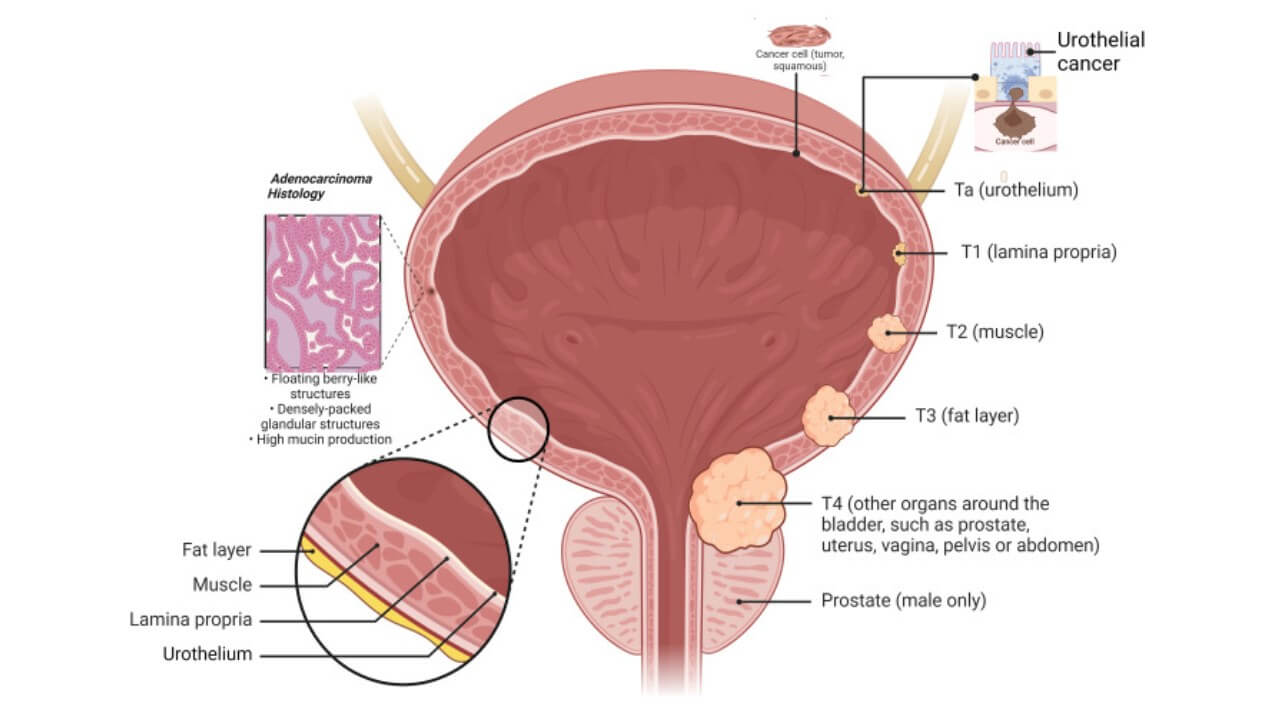
How Bladder Cancer Develops
Bladder cancer usually occurs due to the accumulation of genetic mutations that interfere with normal cell division. These cancer cells may evade the natural checkpoints of the immune system, allowing for the proliferation of tumor cells. Chronic bladder irritation, exposure to carcinogens, and smoking can accelerate this process. Without control of proliferation, this may ultimately lead to disease progression and an incidence of bladder cancer metastases. [3]
Risk Factors for Bladder Cancer
Several factors are associated with an increased incidence of bladder cancer. The most significant being smoking, which permits substances to enter the bladder and, over time, injure the cells of the bladder lining. Occupational exposure to certain industrial chemicals, chronic cystitis, medications, and older age are also known factors affecting bladder cancer incidence. Males are affected more than females. Genetic factors may modify the behavior of tumor cells [4]. Knowledge of the associated factors is important for bladder cancer treatment.
Immunotherapy for Bladder Cancer in Germany
Germany is a global leader in bladder cancer treatment, offering cutting-edge bladder cancer immunotherapy to help bladder cancer cells be recognized and destroyed by the body’s immune system. Specialists use a range of systemic and local approaches to stimulate a targeted immune response and attack cancer cells, providing personalized advanced bladder cancer treatment.
Immune Checkpoint Modulation
An important systemic strategy being implemented in Germany is immune checkpoint modulation, which enhances the ability of immune cells to recognize and attack cancer cells. Bladder cancer cells can evade immune recognition through natural inhibitory pathways or checkpoints, which are designed to reduce immune reactivity. By modulating these checkpoints, German physicians can "take off the brakes" on the immune system, allowing T-cells, among others, to recognize and effectively kill tumor cells.
At the cellular level, this therapy increases the activity of cytotoxic T-lymphocytes, which recognize antigens on bladder cancer cells and induce apoptosis, effectively killing them. It also stimulates the production of signaling molecules (cytokines), which affect the tumor microenvironment, attracting more immune cells and significantly enhancing the immune system response. In patients with metastatic bladder cancer, this approach stimulates systemic immunity that controls the growth of tumors not only in the urinary bladder but also at distant sites that may have been invaded by the bladder cancer cells.
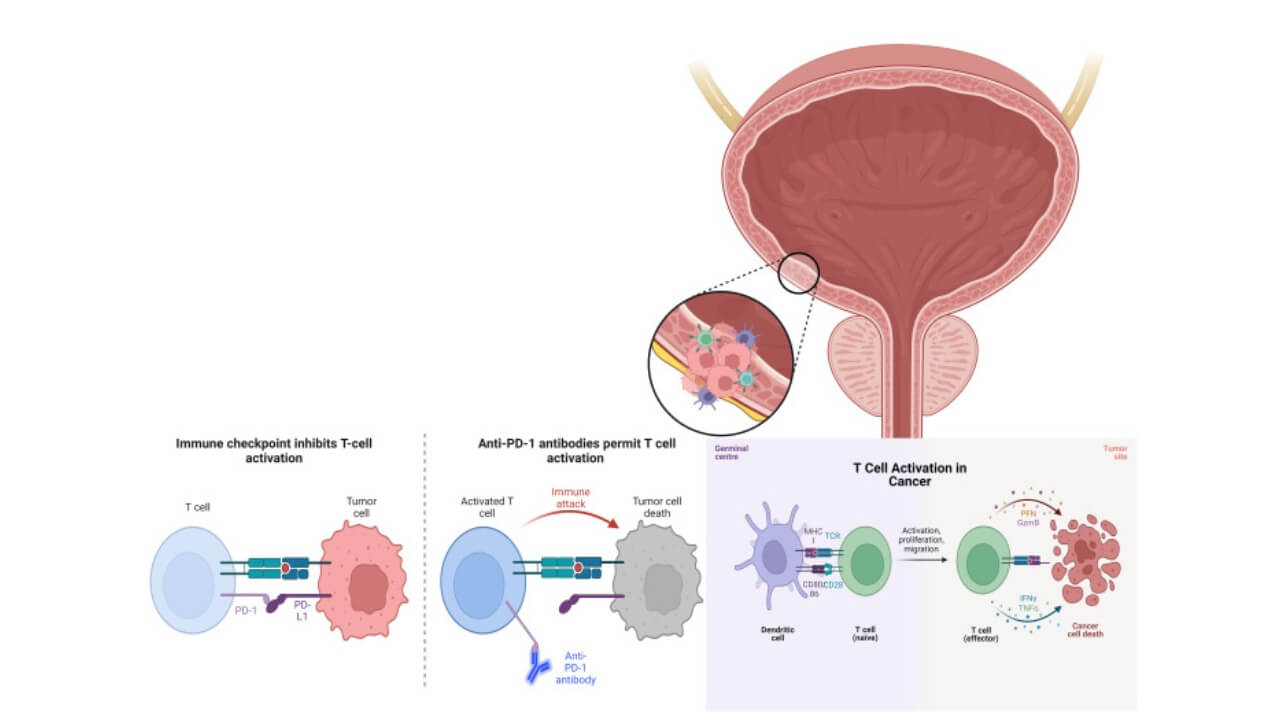
Adoptive Cell Therapy
Adoptive cell therapy (ACT) is yet another highly individualized systemic approach in which the patient’s own immune cells are employed. In this modality, the patient’s T-cells or other immune cells are removed and propagated in vitro. During proliferation, cells are "trained" in a special way to recognize tumor cells. Special techniques are used to enhance their cytolytic activity and their ability to infiltrate tumor nodules.
Once reinfused into the patient, these immune cells circulate throughout the body, target bladder cancer cells, and launch a direct attack. The mechanism works in large measure through the cells’ ability to bind to specific antigens on the surface of tumor cells, liberate perforin and granzymes to induce cell death, and secrete cytokines that recruit other immune cells to the site of disease and facilitate the immune attack. This approach is particularly effective in advanced bladder cancer treatment, since it provides an individualized and very potent systemic defense against bladder cancer cells, which may be resistant to standard bladder cancer treatment.
Cancer Vaccines
A new technique in bladder cancer immunotherapy is based on the use of dendritic cell vaccines. Dendritic cells are special cells of the immune system that are responsible for causing a specific immune response against the bladder cancer cells. The dendritic cells are educated to recognize the tumor cells and then reinfused into the patient. In this way, they activate the immune cells and attack cancer cells. This concept has radically changed the definition of vaccines used in cancer treatment, since it is based upon the revolutionary discoveries of the 2011 Nobel Prize winners in the field of immunology.
In Germany, the dendritic cell vaccines are indicated for early-stage bladder cancer treatment and as part of the systemic treatment of advanced bladder cancer. These vaccines harness the body's immune system to create a strong and specific immune response that is responsible for controlling tumor growth and slowing disease progression. This technique demonstrates how bladder cancer immunotherapy works by ensuring the body's immune system attacks cancer cells effectively and safely.
Intravesical Immunotherapy
In the case of non-invasive bladder carcinoma or early-stage bladder cancers, instillation of immune-stimulatory agents into the bladder in the form of intravesical immunotherapy is indicated [5]. With this localized strategy, the effect on bladder cancer cells is maximized while systemic side effects are minimized. Immune cells within the lining of the bladder are stimulated to kill cancer cells, whereby the recurrence of non-invasive bladder cancer is diminished with improvement of the long-term health of the bladder. This procedure is highly effective and is widely used in German clinics as a first-line bladder cancer immunotherapy in eligible patients [6].
| Indicator | Systemic bladder cancer immunotherapy | Intravesical bladder cancer immunotherapy |
|---|---|---|
| Early-stage | Rarely used | First-line treatment |
| Advanced bladder cancer | Main method | Additional option |
| Effect on Tumor Cells | Systemic control of tumor cells throughout the body | Local control of tumor cells in the bladder lining |
| Frequency of Use | Varies depending on the patient's condition | Regular instillations, protocol-dependent |
| Side Effect Profile | Rarely may include mild systemic immune reactions | Mainly localized mild urinary side effects |
Benefits of Immunotherapy for Bladder Cancer in Germany
Germany presents an exceptional combination of advanced protocols for bladder cancer treatment, modern hospital facilities, and highly trained specialists. Bladder cancer patients benefit from access to progressive bladder cancer immunotherapy, which is constantly modified in light of new research and clinical recommendations. Leading hospitals are offering systemic and intravesical immunotherapies.
One of the main advantages is the expertise of German oncologists, urologists, and immunotherapy specialists. These specialists can manage the treatment in complex cases of advanced bladder cancer with precision in both planning and execution. Clinics combine a variety of modern methods, allowing for favorable results with minimal risk. German hospitals can also provide patients with access to structured protocols and treatment regimens that may not be available in other countries. Multidisciplinary tumor boards review each case and combine surgical, oncological, radiological, and immunotherapeutic approaches. All bladder cancer patients are assured of their therapies being modern and also safely and efficaciously delivered.
Finally, it may be said that the health system in Germany has a strong emphasis on patient-centered treatment pathways for bladder cancer. From the initial assessment to follow-up care, patients will be treated with minimal delay and waiting. Being treated in specialized treatment centers with expertise in bladder cancer and immunotherapy will allow patients to have case management and bladder cancer treatment that can be classified as world-class and executed with confidence and peace of mind.
| Stages of bladder cancer | Immunotherapy | Chemotherapy | Targeted therapy | Radiation therapy |
|---|---|---|---|---|
| Localized | 90% | – | – | – |
| Locally advanced | 85% | – | 60% | – |
| Metastatic | 70% | 20% | 50% | 30% |
Eligibility and Patient Selection for Immunotherapy in Germany
Germany’s approach to bladder cancer treatment emphasizes careful patient selection to maximize safety and effectiveness. Both systemic and intravesical immunotherapy require thorough assessment to determine suitability.
Assessment of Bladder Cancer Stage
The specialist determines the stage of the bladder cancer. The staging is done by imaging and histopathological evaluation of the bladder cancer to find various tumor characteristics, and this helps to make a different choice between systemic, local or mixed forms of treatment.
Health Criteria and Comorbidities
In addition, the patient's health status and comorbidities will influence eligibility for the program. No serious autoimmune disorders must be confirmed, as these would be prohibitive for the treatment. The medical staff must decide in this particular case whether cell cancer treatment or cancer vaccines can be introduced safely into the treatment protocol for the full advantage, which is necessary for the prevention of bladder cancer recurrence.
Pre-Treatment Diagnostics and Preparation
Before starting treatment, a comprehensive diagnostic examination should be performed, including blood tests, as well as imaging and biopsy if necessary. As well, the patients are given counseling to explain the various processes, possible side effects, and follow-up care. This standardization allows clinicians to be sure that the immune system of the body is supported and that the patients know everything about the treatment.
Patient Story: Michael’s Journey to Recovery
Michael is a 62-year-old engineer from the UK who was diagnosed with advanced cancer of the bladder. He had been experiencing persistent blood in the urine and a lot of pain when urinating. His diagnosis was a shocking one, and the initial treatment he received in his home country gave him no improvement. With an invasive cancer of the bladder, he and his family started researching and found the best treatment in Germany.
Through the coordination service, he was connected with a leading German cancer treatment center that had particular experience in bladder cancer treatment. Michael underwent a full assessment in this clinic by a team of oncologists, urologists, and immunotherapists. From this assessment, the team developed a specific treatment program consisting of a full regimen of systemic and intravesical immunotherapies.
Within a few months, the follow-up scans showed the number of tumor cells had markedly decreased and the rate of progression of his disease had dramatically slowed down. Michael suffered very few side effects due mainly to the specific protocols and very high standards of monitoring, which were carried out at the German clinic. Apart from the medical consequences, Michael appreciated the support and care that he received from the doctors and healthcare team who guided him through each step of the treatment, explaining each procedure to him and putting his mind at ease with regard to his medical condition.
Michael is back doing his daily activities today, with regular check-ups ensuring that his bladder cancer cells are under control. He attributes his remarkable recovery to the very high standards of medical care that are available through advanced bladder cancer treatment protocols, the expertise of the medical team in Germany, and the organized patient-care approach to treatment there. His case shows the potential of modern immunotherapy not only to treat bladder cancer but also to enhance the quality of life and long-term benefit in the future.
A Medical Journey: Every Step of the Way With Booking Health
Finding the best treatment strategy for your clinical situation is a challenging task. Being already exhausted from multiple treatment sessions, having consulted numerous specialists, and having tried various therapeutic interventions, you may be lost in all the information given by the doctors. In such a situation, it is easy to choose a first-hand option or to follow standardized therapeutic protocols with a long list of adverse effects instead of selecting highly specialized innovative treatment options.
To make an informed choice and get a personalized cancer management plan, which will be tailored to your specific clinical situation, consult medical experts at Booking Health. Being at the forefront of offering the latest medical innovations for already 12 years, Booking Health possesses solid expertise in creating complex management programs in each individual case. As a reputable company, Booking Health offers personalized treatment plans with direct clinic booking and full support at every stage, from organizational processes to assistance during treatment. We provide:
- Assessment and analysis of medical reports
- Development of the medical care program
- Selection of a suitable treatment location
- Preparation of medical documents and forwarding to a suitable clinic
- Preparatory consultations with clinicians for the development of medical care programs
- Expert advice during the hospital stay
- Follow-up care after the patient returns to their native country after completing the medical care program
- Taking care of formalities as part of the preparation for the medical care program
- Coordination and organization of the patient's stay in a foreign country
- Assistance with visas and tickets
- A personal coordinator and interpreter with 24/7 support
- Transparent budgeting with no hidden costs
Health is an invaluable aspect of our lives. Delegating management of something so fragile yet precious should be done only to experts with proven experience and a reputation. Booking Health is a trustworthy partner who assists you in pursuing stronger health and a better quality of life. Contact our medical consultant to learn more about the possibilities of personalized treatment with innovative methods and with leading specialists in this field.
Cancer Treatment Abroad: Patient Experiences with Booking Health
Frequently Asked Questions about bladder cancer immunotherapy
Send request for treatmentBladder cancer immunotherapy uses drugs to stimulate the immune system so that immune cells can recognize cancer cells and destroy them. Drugs target the proteins or surface receptors on cancer cells, activating defense systems of the body against the disease.
Benefits include a targeted bladder cancer treatment approach, fewer systemic side effects compared to traditional therapies, and the possibility of long-term remission.
The evaluation of the efficacy is performed in the form of regular blood tests, images, and clinical examinations. This helps doctors to assess its benefits and make the necessary changes to improve the cancer treatment for the patient.
The side effects include fatigue, skin reactions, and flu-like symptoms. Serious side effects, however rare, may also occur, and close monitoring of cancer treatment is required to manage side effects of immunotherapy.
Yes, immunotherapy can be combined with chemotherapy, radiotherapy, as well as targeted therapies. Such combination therapy has been found to increase the overall effectiveness of cancer treatment.
Bladder cancer immunotherapy can help some patients achieve long-term remission by boosting the body’s natural defenses, especially in cases of advanced bladder cancer where conventional cancer treatments may be limited.
Complete and permanent cure is not guaranteed, as bladder cancer cells can sometimes persist or recur. Continuous monitoring is essential to detect any early signs of recurrence.
Fatigue, inflammation, and immune reactions are some side effects of treatment. They are, however, easily managed and controlled.
Recurrence happens because some tumor cells can remain hidden or resist initial treatment. Early detection and follow-up are critical.
Germany provides a range of immunotherapy options for bladder cancer, from systemic therapies that boost the immune system to localized intravesical immunotherapy that targets tumors directly within the bladder.
The mechanism of immunotherapy for bladder cancer involves stimulating immune cells to recognize and destroy bladder cancer cells, helping control disease progression.
Yes. Immunotherapy combined with chemo or radiation for bladder cancer is safe and effective, showing good results in advanced bladder cancer treatment.
Systemic immunotherapy treats bladder cancer throughout the body targeting both primary tumors and potential metastases. In contrast, intravesical immunotherapy is localized, directly stimulating immune cells in the bladder to attack cancer cells and minimize systemic side effects. Both methods aim to treat bladder cancer effectively.
Immunotherapy can treat cancer at different stages with varying effectiveness: about 90% in localized stages, 85% in locally advanced stages, and 70% in metastatic stages. These rates demonstrate the potential of immune-based therapies to treat bladder cancer as part of comprehensive care.
Which treatment is more effective for advanced kidney cancer: immunotherapy, targeted therapy, or chemotherapy?
For advanced kidney cancer, immunotherapy shows higher efficacy (70%) compared to targeted therapy (50%) and chemotherapy (20%) highlighting its role in treating bladder cancer patients with systemic involvement.
Intravesical immunotherapy is recommended for non-invasive or early-stage bladder cancer, providing localized treatment to reduce recurrence and treat bladder cancer effectively while minimizing systemic side effects.
What are the survival or response rates of immunotherapy in localized, advanced, and metastatic kidney cancer?
Survival and response rates vary: 90% for localized disease, 85% for locally advanced and 70% for metastatic stages. These outcomes demonstrate how immunotherapy can treat bladder cancer cells both locally and systemically, depending on the stage of disease progression.
In Germany bladder cancer patients can access a full range of immunotherapy options. Treatments are personalized and performed in specialized centers. Also they are combined with standard oncology care to optimize immune response.
Authors:
This article was edited by medical experts, board-certified doctors Dr. Nadezhda Ivanisova, and Dr. Bohdan Mykhalniuk. For the treatment of the conditions referred to in the article, you must consult a doctor; the information in the article is not intended for self-medication!
Our editorial policy, which details our commitment to accuracy and transparency, is available here. Click this link to review our policies.
Sources:
[1] Sattam A Halaseh, Shahed Halaseh, Yaman Alali et al. A Review of the Etiology and Epidemiology of Bladder Cancer: All You Need To Know. Cureus. 2022 Jul 27;14(7):e27330. doi: 10.7759/cureus.27330. [DOI] [PMC free article]
[2] Tobechukwu J Okobi, Trinitas Oserefuamen Uhomoibh, Darlington E Akahara et al. Immune Checkpoint Inhibitors as a Treatment Option for Bladder Cancer: Current Evidence. Cureus. 2023 Jun 6;15(6):e40031. doi: 10.7759/cureus.40031. [DOI] [PMC free article]
[3] G H Friedell, J B Jacobs, G K Nagy, S M Cohen. The pathogenesis of bladder cancer. Am J Pathol. 1977 Nov;89(2):431-42. [PubMed]
[4] Slavenka Janković, Vladan Radosavljević. Risk factors for bladder cancer. Tumori. 2007 Jan-Feb;93(1):4-12. doi: 10.1177/030089160709300102. [DOI] [PubMed]
[5] Mohamad Abou Chakra, Yi Luo, Igor Duquesne, Michael A O'Donnell. Update on the Mechanism of Action of Intravesical BCG Therapy to Treat Non-Muscle-Invasive Bladder Cancer. Front Biosci (Landmark Ed). 2024 Aug 21;29(8):295. doi: 10.31083/j.fbl2908295. [DOI] [PubMed]
[6] Niels Schaft, Jan Dörrie, Gerold Schuler et al. The future of affordable cancer immunotherapy. Front Immunol. 2023 Sep 6:14:1248867. doi: 10.3389/fimmu.2023.1248867. [DOI] [PubMed]
Read:
Cancer immunotherapy in Germany
Article menu:
- What Is Bladder Cancer
- Immunotherapy for Bladder Cancer in Germany
- Benefits of Immunotherapy for Bladder Cancer in Germany
- Eligibility and Patient Selection for Immunotherapy in Germany
- Patient Story: Michael’s Journey to Recovery
- A Medical Journey: Every Step of the Way With Booking Health
- Frequently Asked Questions about bladder cancer immunotherapy
Don't know where to start?
Contact Booking Health